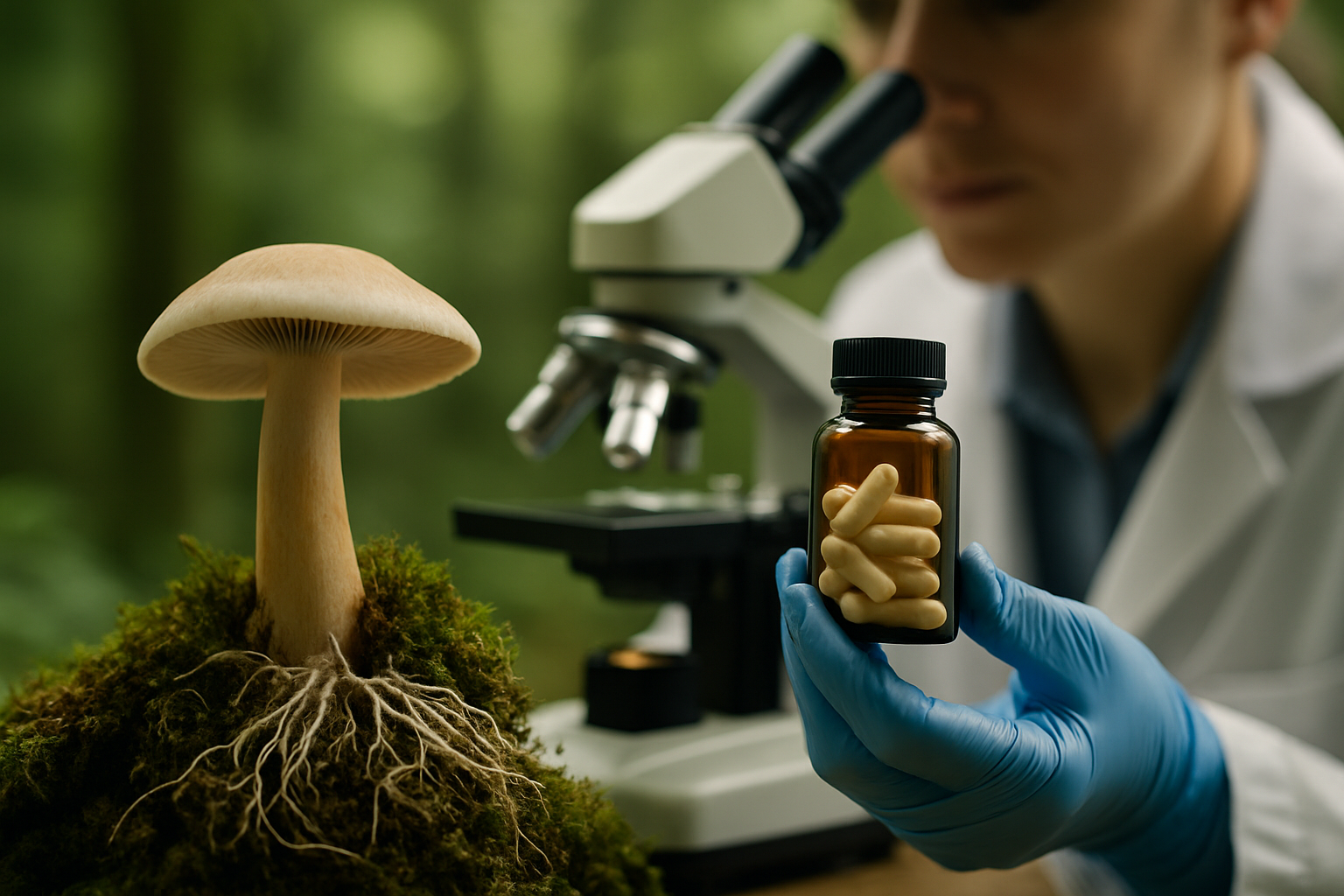Mycelium Supplements: The Fungi Frontier of Immune Support
Are you looking beyond traditional wellness approaches for immune support? The world of functional mushrooms offers a fascinating alternative that's gaining scientific attention. While many focus on common supplements like vitamin C or zinc, mycelium—the root structure of mushrooms—represents an untapped reservoir of immune-enhancing compounds. This emerging wellness trend combines ancient wisdom with cutting-edge research, potentially transforming how we approach immune health through nature's complex underground networks.

Understanding the Mycelium Marvel
Mycelium refers to the vegetative part of fungi—essentially the root system that grows underground or within substrates. Unlike the fruiting bodies (mushrooms) we commonly recognize, mycelium forms vast interconnected networks that can span thousands of acres. These remarkable structures have existed for over 800 million years, evolving complex defense mechanisms against environmental threats. Scientists have discovered that many of these defensive compounds, when consumed by humans, can potentially bolster our immune responses through similar pathways.
The historical use of medicinal mushrooms dates back thousands of years in traditional Chinese, Japanese, and Eastern European medicine systems. However, modern research has shifted focus beyond the fruiting bodies to the mycelium itself, which contains unique bioactive compounds not present in the mushroom caps. These compounds include beta-glucans, terpenoids, and specialized proteins that interact with human immune receptors in ways researchers are only beginning to understand.
The Science Behind Mycelium Immunomodulation
Mycelium supplements work through several distinct pathways to support immune function. Most notably, beta-glucans—complex polysaccharides found abundantly in mycelium—interact with specific receptors on immune cells, including macrophages, neutrophils, and natural killer cells. This interaction triggers an immune cascade that enhances the body’s surveillance and response systems without overstimulating immunity.
Research published in the Journal of Immunology Research demonstrated that mycelium extracts from species like Trametes versicolor (Turkey Tail) contain unique protein-bound polysaccharides that support T-cell and natural killer cell activity. Similarly, studies on Cordyceps militaris mycelium have shown potential regulation of cytokine production—the signaling molecules that coordinate immune responses.
What makes mycelium particularly interesting is its adaptogenic quality, meaning it can help modulate immune function bidirectionally rather than simply boosting it. This becomes crucial for addressing conditions involving dysregulated immunity, where balance rather than stimulation is required.
From Forest Floor to Supplement Form
The journey from living mycelium to consumable supplement involves sophisticated cultivation and extraction processes. Unlike mushroom fruiting bodies that can be grown relatively quickly, mycelium cultivation requires careful substrate preparation and environmental control to maximize bioactive compound production.
Commercial production typically involves growing mycelium on nutrient-rich substrates under controlled conditions. The extraction methods then employed significantly impact the final product’s efficacy. Hot water extraction, alcohol extraction, and dual extraction methods each yield different compounds, with some manufacturers employing proprietary techniques to standardize specific bioactive markers.
A key challenge in this industry is quality control and standardization. Some products labeled as “mycelium” supplements actually contain substantial amounts of the growth substrate (often grain), potentially diluting active compounds. Leading companies now employ advanced analytical methods including high-performance liquid chromatography and mass spectrometry to verify bioactive compound concentrations.
Comparing Key Mycelium Varieties for Immune Support
Different fungi species produce mycelium with distinct immunological properties, making certain varieties more suitable for specific health concerns:
Reishi (Ganoderma lucidum) mycelium contains triterpenes and polysaccharides that demonstrate immunomodulatory effects. Research suggests these compounds can enhance natural killer cell activity while potentially regulating inflammatory responses. Its mycelium appears particularly effective at supporting adaptive immunity, the branch responsible for remembering specific pathogens.
Lion’s Mane (Hericium erinaceus) mycelium produces unique compounds called erinacines that are absent in the fruiting body. These compounds show promise for neurological immunity through their ability to stimulate nerve growth factor production, potentially supporting the brain’s immune defenses.
Chaga (Inonotus obliquus) mycelium offers impressive antioxidant properties alongside immune-supporting beta-glucans. Studies indicate it may help regulate inflammatory cytokines while supporting normal cell division—a crucial aspect of immune surveillance.
Cordyceps militaris mycelium contains cordycepin, a compound structurally similar to adenosine that demonstrates unique effects on immune signaling pathways. Research suggests it may help modulate excessive immune responses while supporting respiratory immunity.
Integrating Mycelium Supplements into Daily Wellness
The practical application of mycelium supplements requires consideration of several factors. Unlike pharmaceuticals with standardized dosing protocols, functional mushroom supplements benefit from an individualized approach:
Form and bioavailability significantly impact effectiveness. Mycelium extracts standardized for specific compounds typically offer better absorption than simple powdered products. Liquid extracts may provide faster absorption, while capsules offer convenience and precise dosing.
Timing and consistency matter more than immediate effects. Research suggests mycelium compounds work through cumulative mechanisms, gradually training immune responses rather than producing immediate results. Most clinical studies showing benefits employed consistent daily supplementation for 8-12 weeks minimum.
Potential interactions require attention, particularly for those on immunosuppressive medications or with autoimmune conditions. While generally considered safe, the immunomodulating effects could theoretically interact with certain medications. Healthcare provider consultation before beginning supplementation remains prudent, especially for these populations.
Practical Implementation Strategies for Maximum Benefit
-
Start with single-species supplements before trying combinations to identify individual responses and tolerance
-
Look for products specifying “full-spectrum” extracts containing both water-soluble and fat-soluble compounds
-
Verify third-party testing for both identity (correct species) and potency (bioactive compound content)
-
Consider cycling between different mycelium varieties quarterly to target diverse immune pathways
-
Combine supplementation with immune-supporting lifestyle factors including adequate sleep, stress management, and micronutrient sufficiency
-
For prevention, lower doses taken consistently often prove more effective than higher doses used reactively
The Future of Fungal Immunology
As research into mycelium compounds accelerates, we’re likely witnessing only the beginning of fungi’s potential contribution to immune health. Scientists are currently investigating specific mycelium-derived compounds for targeted immune applications, including the development of novel adjuvants that could enhance vaccine effectiveness.
The intersection of traditional knowledge and modern science continues to reveal the sophisticated relationship between fungi and human health. By harnessing the defensive wisdom these ancient organisms have developed over millions of years, we may discover immune support solutions uniquely suited to modern challenges. The mycelium network—nature’s original communication system—may well hold keys to optimizing our body’s most complex defense network.






